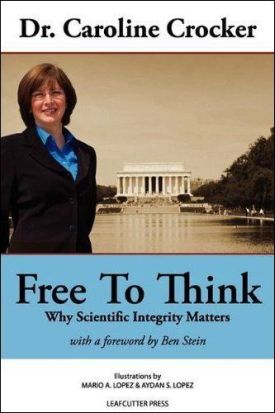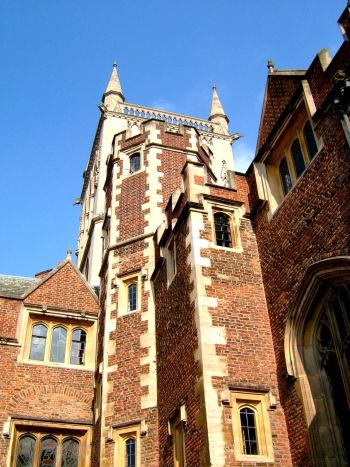The frightful level of thought control in American academia
from here: http://creation.com/review-free-to-think-caroline-crockerA review of Free to Think: Why Scientific Integrity Matters by Dr Caroline Crocker
Leafcutter Press, Southworth, WA, 2010

This book is not an easy read. There is so much detail that the reader may find it tedious. On the other hand, the documentation given to support its claims is exhaustive. Specific events and conversations are presented in minute detail. This work intersperses the author’s experiences with particular biology lessons. Profuse online and written references are included. Several appendices in the book include a glossary, copies of emails and letters from students (names blacked out to protect privacy), letters from faculty heads leading to Crocker’s dismissal, letters related to the grievance process, legal documents regarding the case, etc.
The challenges of being a new college teacher
The author describes how she became a college teacher in biology, and how she strove to make her classes informative and interesting. She told students who worked or had other commitments that they should not be taking her course if they do not have the time to study for it. If they found her policies unfair, they could withdraw from her course in favor of another one.Crocker also had to deal with students who cheated on tests, and with students who wanted to pressure her for a grade that they had not earned. At one point in time, near the end of the grading period, she was repeatedly harassed by a gentleman who tried to get her to raise his grade. Eventually, she had to have the campus security escort him away from her. However, he did learn his lesson. He later took another course with her and, having learned how to apply himself, earned a high grade for that course.
Challenging evolutionary shibboleths
Crocker, while teaching biology classes, showed the fallacy of Kettlewell’s peppered moths as evidence for evolution. The proportion of dark and lighter moths varied, but they remained moths. What’s more, it turned out that the moths had been nailed to tree barks before being photographed; they do not habitually land on trunks. The actual cause for the shift from a gray-majority to black-majority moth population remains unclear.She also discussed antibiotic-resistant bacteria. They remained bacteria. The same can be said for the Galápagos finches. Urey–Miller origin-of-life experiments do not even begin to account for the origin of life and its complexity.
All along, Crocker emphasized the fact that scientific theories, including ones that seemed unquestionable, get thrown out in the face of new evidence. She cited some examples.
ID is not religion
Cocker briefly showed some slides that illustrated the concept of Intelligent Design, but did not dwell on this topic. Despite being mischaracterized by its detractors as such, Intelligent Design is not creationism in disguise, nor is it, in of itself, a religious concept (though, of course, it can have theistic implications, just as evolution can have atheistic implications).Even simple everyday examples lead us to understand what is purposeful action and what is not, and it has nothing to do with religion. An example is given of a dead man found in the forest. Up to that point, his death may have been thought accidental or deliberate. An arrow is found in his chest. It could still have been an accident, or it could have been deliberate. Finally, a set of arrows is found embedded in his chest. Clearly, everyone knows that it was a deliberate act of murder. Crocker asks the student how they know this. “We just know”, they answer.
The non-religious nature of ID has other practical implications. Crocker adds:
“Even Einstein, although not a believer in a personal God, firmly believed that the physical laws governing the universe exhibited evidence of design. He used this principle to guide his work, ‘When I am judging a theory, I ask myself if I were God, would I have arranged the world in such a way?’” (p. 198).In the modern ID movement, Dr Steven Fuller and Dr David Berlinski are examples of members who are not theists at all.
Embedded biology lessons
Apart from evolution-related issues, this book contains illustrated short biology lessons throughout the text. This in informative, but, to some readers, may serve as a distraction from the main subject of this book. The embedded biology lessons include those related to the function of T-helper cells and the immune system, DNA and protein synthesis, how to solve a chemistry problem (with numbers included), dominant and recessive traits, DNA use for solving crimes, intracellular communication, etc.An outstanding teacher faces discrimination
By all objective measures, Crocker became an outstanding teacher. She got grants, and did other work far beyond what was required of her. She developed teaching materials that were used by other teachers. Her students consistently praised her, notwithstanding her strictness with tardiness and cheating.It is humorous to see how, to this day, certain evolutionists continue to deny the obvious fact that her contract non-renewal was a blatant act of discrimination. To begin with, there was an ongoing demand for biology teachers at this school, so her contract non-renewal could not possibly have had anything to do with her services no longer being needed.
Dr Carter, her supervisor, in a meeting with Crocker, told her that there were complaints that she was teaching creationism. No proof was presented as to when and how she had taught creationism. In fact, the complaints were not even in writing. Numerous students then wrote letters categorically refuting the accusation.
The normal grievance procedure was not followed. Neither Carter nor any of the other faculty ever observed her actually teaching. Carter simply told her, out of the blue, that, from now on, she could only teach lab courses. In a later hearing, he said, correctly, that it was his prerogative to assign a teacher to lab courses. However, Crocker comments:
“But this completely begged the issue of him withdrawing me from teaching the lecture at the last minute, after the catalog had been published, and then telling me and others that the reason for it was to discipline me for teaching creationism” (p. 113).(Imagine a department leader telling a professor that he was exercising his prerogative to assign teachers to lab courses, but doing so because the professor was black.)
www.sxc.hu/profile/fanf

Figure 1. Are universities really bastions of academic freedom?
Although Crocker’s mind was centered on teaching, and helping students, and she disliked conflict and confrontation, she decided to pursue legal action to fight the discrimination that she had experienced. An attorney, Edward, prepared a case pro bono. Evidently, his law firm was bought out, and he was terminated. Perhaps ironically, Edward was unable to get another job, likely because he was tainted with the Darwin-doubting label.
Later, the ACLJ (American Center for Law and Justice) could not help her because her eviscerated file had prevented a credible legal case from being constructed about her situation.
As an aside, imagine what would happen if there was so much as a hint of suspicion about a professor’s contract not renewed because he/she was a Communist, a homosexual, or a habitual mocker of Christianity. Well-funded ‘civil liberties’ organizations would come to his/her defense in an instant.
Crocker tried and tried to get another teaching position. Despite her exemplary qualifications, she usually did not get as much as a response. She suspects that she had been blacklisted on the Internet.
Protecting science?
Although those who oppose any challenge to evolution profess to be defending science, they, ironically, are doing just the opposite. Crocker comments:“We are being stifled into a politically correct ideology and scientists are being motivated more by fear about their reputations and hunt for money than by curiosity. Freedom of inquiry is allowed only within the context of accepting the ‘fact’ or neo-Darwinian evolution. This will have a huge negative impact not only on science, but also on our well-being and economy. One needs only to remember the consequences of Lysenkoism to understand” (p. 182).She adds: “Science has immense potential for good or evil—I do not like the idea of giving over all scientific decisions to those who do not believe in academic freedom or scientific objectivity … ” (p. 194).
The stifling of free inquiry has practical implications, as Crocker relates:
“What about the all-important freedom to think in an unrestricted fashion in research institutes and university classrooms? In the United States, our inventiveness and ability to think outside the box is a large part of what makes us competitive in the global marketplace” (p. 182).The dogmatic promulgation of Darwinian orthodoxy is widespread. Crocker says:
“The suppression of academic freedom and scientific objectivity is not just found at GMU. During the Louisiana House Educational Committee hearings on SB 773 in Baton Rouge in May of 2008, Bryan Carstens, a Louisiana State professor spoke proudly of how he and 59 other biology professors at LSU have signed a document confirming their public agreement with evolution. Since I was present at the hearing, I recall a revealing exchange when a house member wryly asked him what would happen to someone who refused to sign. The silence was deafening” (p. 185).In spite of all the pressures to conform, several hundreds of qualified scientists from all over the world have signed a statement questioning the ability of neo-Darwinism to account for living things. It is regularly updated, and can be found online.1 Of course, secularist fanatics will self-servingly dismiss all of them regardless of the facts. There are also many other scientists, known privately to Crocker, who have verbalized doubts about evolutionary theory but keep their views private for fear of their careers—well justified as Crocker’s experience shows.
Evolutionists excuse the actions against Crocker by asserting that academic freedom, and freedom of speech, does not allow one to say whatever one wants. If so, then who is to decide what the limits of expression are? Considering all the inflammatory and provocative statements college professors have made with impunity (especially against Christianity,2 and in favour of Communist and Islamofascist murderers), this takes on further significance.
Conclusion
Lawyer Ben Stein said it best, on the back cover of this book:“A chilling true life story of how free speech and free inquiry rights have simply vanished in a large swath of the academic community. This story would be depressing in a 1950’s Iron Curtain country. Unfortunately, it’s a contemporary American story and far more upsetting for that reason. This shutdown of the search for truth is not something that could happen. It DID happen.”Dr Caroline Crocker has founded an organization dedicated to preparing college students for careers in science. It is called the American Institute for Technology and Science Education (AITSE), and can be accessed online.3
The kind of discrimination featured in this book will continue as long as evolutionists can get away with it. How long before believers wake up and start fighting back on a large scale for their rights?
No comments:
Post a Comment